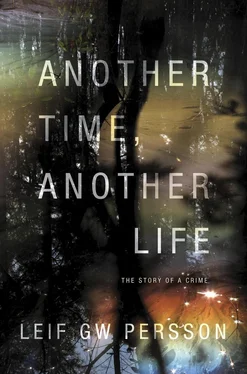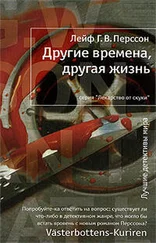“Do you remember when this was taken?” Holt asked. He actually is rather entertaining, she thought.
“End of the sixties, early seventies. I don’t really recall. If you want we can drive out and take a look at the guest book. If we find Kjell then the mystery is solved. He was there only one time as far as I remember. We sailed out to the island on Papa’s boat. It was in Saltsjöbaden. Sten, Kjell, and I and a frightening quantity of jars and bottles.”
“So little Pippi wasn’t along,” said Holt.
“What a sight that would have been,” said Tischler. “No, not really, she was on land with her mom and dad and all the other relatives from nine to ninety who were always hanging around out there.”
“The gang of four?” asked Holt.
“Ah,” said Tischler. “You intend to convict me of youthful radicalism, Inspector. Chinese opposition politicians, conspiracies against the Great Helmsman Mao, and so on.”
“Why would I do that?” said Holt, letting her gaze sweep across the furniture in the room in which they were sitting.
“But here I’m afraid it was much simpler,” Tischler interrupted. “My dear cousin was at that time insanely fond of mysteries and adventure novels, she was rather precocious for her age, and the gang of four, I think, alludes to that novel by Conan Doyle... The Sign of the Four , I believe it’s called. The gang of four was a secret society that the master detective Sherlock Holmes was tracking down.”
“Who took the picture?” Holt asked, mostly to change the subject.
“It was taken with a self-timer, and my dear cousin got the camera from her kind uncle Theo, as she called me. She ran around for days taking the most unflattering pictures. At times there seems to have been sheer panic out there. I remember that her mother — my aunt, that is — scolded me. Personally I kept away as much as possible. It was hardly suitable for a young radical to spend his summer in the country villas of the bourgeoisie. But certainly sometimes I was weak, much too weak.”
“Maybe it’s not really so bad,” said Holt, smiling, “but I know what you’re talking about.” Maybe a little tedious, she thought.
“I know what you mean too and I confess unreservedly,” said Tischler. “All reasonable young people were radical at that time. We were socialists and communists with all the imaginable acronyms. We were always marching to the American embassy, and then there was quite a lot of balling too. Excellent for the health, both of them, and driving your old father up the wall was a pure bonus.”
“I saw in our papers that Kjell Eriksson was politically committed,” said Holt. Balling, she thought. When had she last heard someone use that word? A hundred years ago?
“Oh well,” said Tischler, smiling. “We actually called him the wet thumb, so maybe it wasn’t just commitment.”
“What do you mean?” asked Holt.
“There was a certain amount of opportunism, perhaps,” said Tischler thoughtlessly, “and perhaps certain problems with timing. I remember when he became a social democrat in the spring of 1979 and went on and on for a whole evening about how as soon as the election was over his union fortune would finally be made and now the bourgeoisie would be gone. Whereupon they won with a tie-breaking vote in parliament and stayed until 1982.”
“You were all young socialists at that time,” said Holt.
“I’m still a socialist,” said Tischler, sounding almost offended. “I’ve always had my heart to the left... and my wallet to the right,” he added with a broad smile. “As I said, we were all radicals back then, socialists or communists. For the same reason that today all reasonable people have left that behind them as soon as they realized where it was going.”
“But you’re not an opportunist,” said Holt.
“That is patently absurd,” said Tischler solemnly. “Hell, I was born with a whole set of silverware in my mouth. I’ve never needed to be an opportunist.”
“But Kjell Eriksson needed to be,” said Holt.
“Yes,” said Tischler, suddenly sounding serious. “And the way things were for him when he was growing up I have a very hard time holding that against him. People try to adapt themselves to the time they live in, and when times change their lives change too. There are very few of us for whom things are so ordained that we, like a strong current, can ride our own waves through the sea.”
“Nicely put,” said Holt.
“I know,” said Tischler, grinning. “I have to confess I swiped it from a book.”
“What do you say about having dinner in Paris, this evening?” said Tischler, keeping hold of Holt’s hand in his when she was about to leave.
“Unfortunately,” said Holt, smiling, “I’m afraid that won’t work. In another time and another life maybe,” she said.
“I live in hope,” said Tischler, looking at her with his very attentive eyes.
17
Thursday, December 14, 1989
At the investigation team’s last meeting before the weekend the opposing factions came into the open.
Out-and-out fucking mutiny, thought Bäckström as he marched out of the room, his face bright red, after they were through quarreling.
Bäckström started pushing his homo lead again, for the umpteenth time, and now even the three younger colleagues who were on loan from the uniformed police were starting to give audible expression to their doubts.
“You don’t think there’s a risk we’ll get locked in?” the first one of them began cautiously. She was the only woman of the three. “In school we learned that it was crucial to have a broad and open attitude to this sort of thing.”
Stick it up yours, you little sow, thought Bäckström, but he wasn’t going to say that when there were witnesses present, so it had to be something else instead.
“I’m listening,” Bäckström said smoothly. “What did you mean to propose instead?”
“I don’t know,” she continued hesitantly, “but what is there that actually indicates that Eriksson was homosexual?”
“Apart from what the forensic doctor and his two best friends for twenty years say,” sneered Bäckström, “is there anything in particular you’re missing? Sailor costume, Vaseline jar, mesh stockings way back in the dresser drawer? Some good porno tapes with well-oiled butt princes?” Or maybe you want Uncle Evert to grease your little mouse for you, he thought.
“Hang on,” said Jarnebring, giving Bäckström the same look he always did when he had decided that enough was enough. “Me and my colleague Holt here,” said Jarnebring, nodding toward her, “have turned Eriksson’s apartment inside out. If anyone thinks we’ve missed something, then he or she is welcome to try themselves. We haven’t found a damn thing that clearly indicates that Eriksson had any sexual orientation whatsoever. We’ve even checked his sheets — because colleague Wiijnbladh apparently forgot that small detail — and just like his cleaning woman for the past two years — because we’ve also talked with her — we haven’t found the slightest little trace of sperm whatsoever. Much less a strand of hair from anyone other than Eriksson himself, or anything that indicates that any sexual activity whatsoever has occurred in that bed or in that bedroom or in that apartment.
“Personally,” Jarnebring continued, raising his right hand slightly when he saw that Bäckström was thinking about saying something, “I would have felt considerably more comfortable if we’d found something of the sort you usually find. Not to mention all those accessories you keep carrying on about all the time.”
“Correct me if I’m wrong,” said Bäckström, “but wasn’t it you who had the idea that someone had cleaned up and removed some stuff from Eriksson’s apartment? A whole suitcase if I remember rightly?”
Читать дальше












